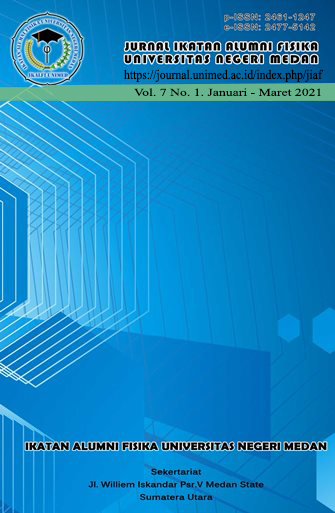PENGARUH MODEL PEMBELAJARAN INQUIRY TRAINING DENGAN PENDEKATAN STEM PADA MATERI FISIKA TERHADAP KEMAMPUAN BERPIKIR KREATIF SISWA KELAS XI SMAN 18 MEDAN
DOI:
https://doi.org/10.24114/jiaf.v7i1.15276Abstract
Penelitian yang berjudul Pengaruh Model Pembelajaran Inquiry Training dengan Pendekatan STEM pada Materi Fisika Terhadap Kemampuan Berpikir Kreatif Siswa Kelas XI SMAN 18 Medan telah dilaksanakan bertujuan untuk mengetahui kemampuan berpikir kreatif siswa dalam pembelajaran fisika. Jenis penelitian yang digunakan yaitu quasi experiment dengan two group pretest-posttest design. Pengambilan sampel dilakukan dengan cara cluster random sampling dari 4 kelas yaitu kelas XI MIPA 2 sebagai kelas eksperimen dan XI MIPA 3 sebagai kelas kontrol. Instrumen penelitian berupa tes kemampuan berpikir kreatif dalam bentuk essay test. Teknik analisis data yang digunakan yaitu uji normalitas, uji homogenitas, uji hipotesis menggunakan uji t. hasil penelitian menunjukkan bahwa ada pengaruh model pembelajaran Inquiry Training dengan pendekatan STEM pada materi pokok Elastisitas dan Hukum Hooke terhadap kemampuan berpikir kreatif siswa.Kata Kunci: Inquiry Training, STEM, Kemampuan Berpikir KreatifDownloads
Published
2021-03-03
Issue
Section
Articles
License
Copyright (c) 2021 JURNAL IKATAN ALUMNI FISIKA UNIVERSITAS NEGERI MEDAN

This work is licensed under a Creative Commons Attribution 4.0 International License.
Authors who publish with this journal agree to the following terms:- Authors retain copyright and grant the journal right of first publication with the work simultaneously licensed under a Creative Commons Attribution License that allows others to share the work with an acknowledgement of the work's authorship and initial publication in this journal.
- Authors are able to enter into separate, additional contractual arrangements for the non-exclusive distribution of the journal's published version of the work (e.g., post it to an institutional repository or publish it in a book), with an acknowledgement of its initial publication in this journal.
- Authors are permitted and encouraged to post their work online (e.g., in institutional repositories or on their website) prior to and during the submission process, as it can lead to productive exchanges, as well as earlier and greater citation of published work (See The Effect of Open Access).

